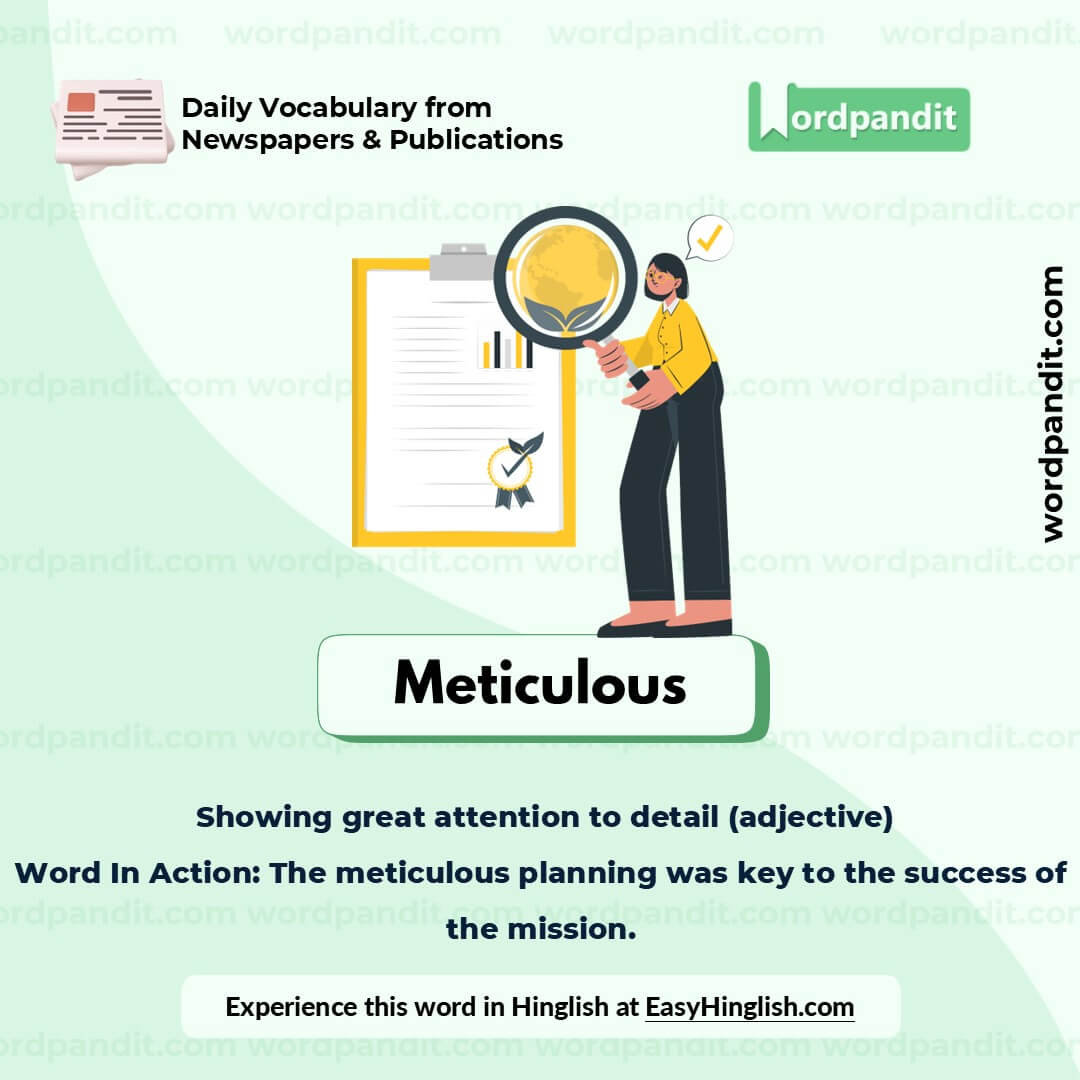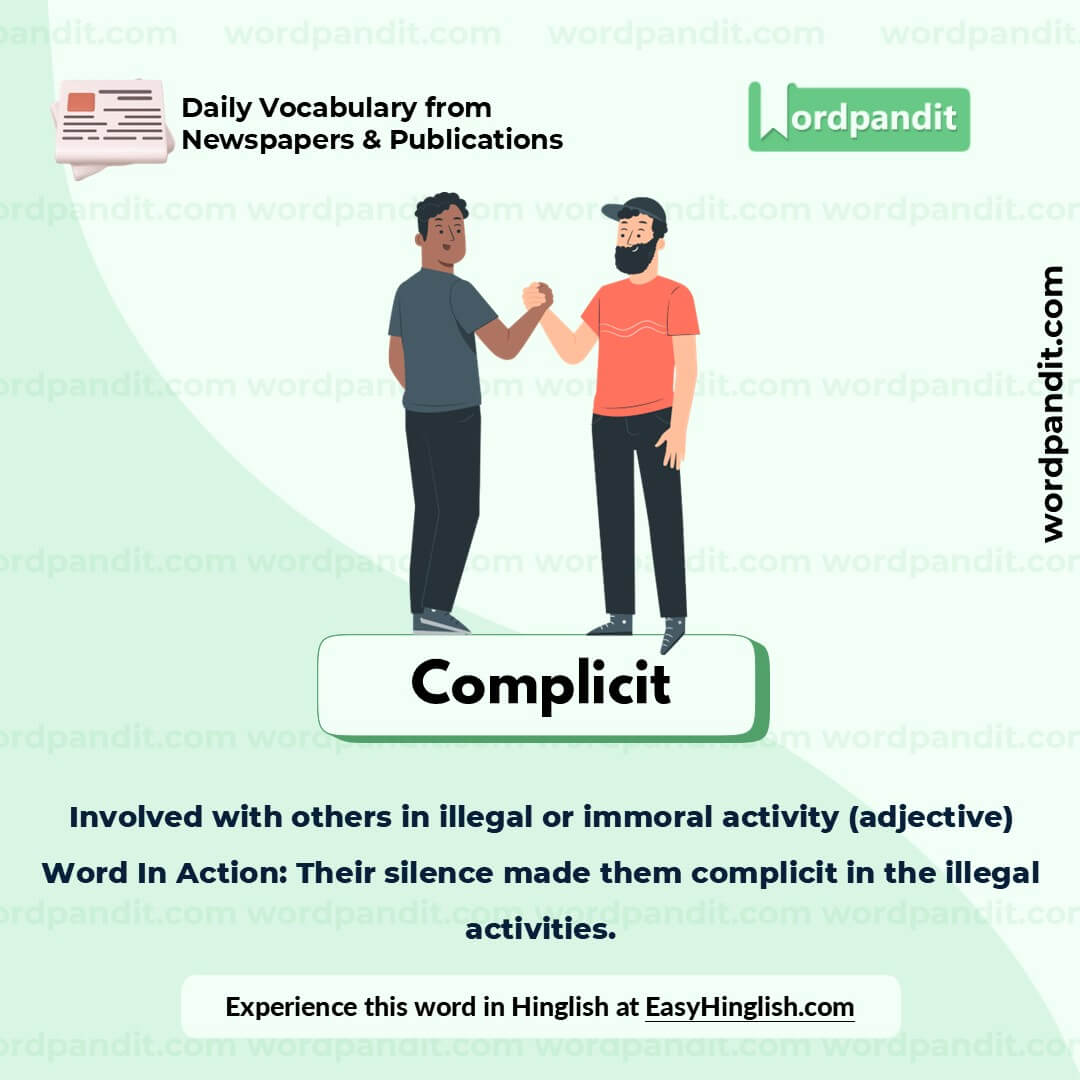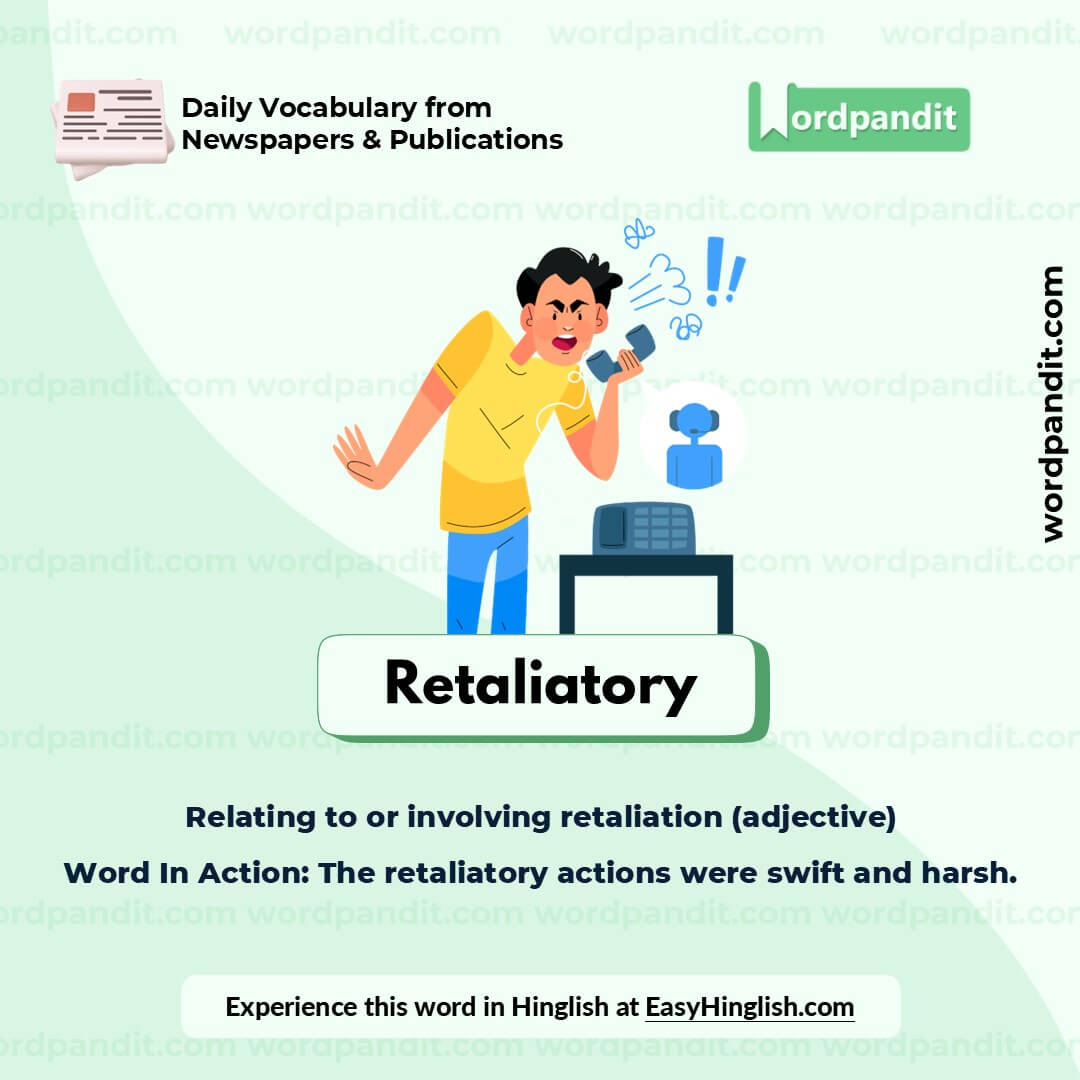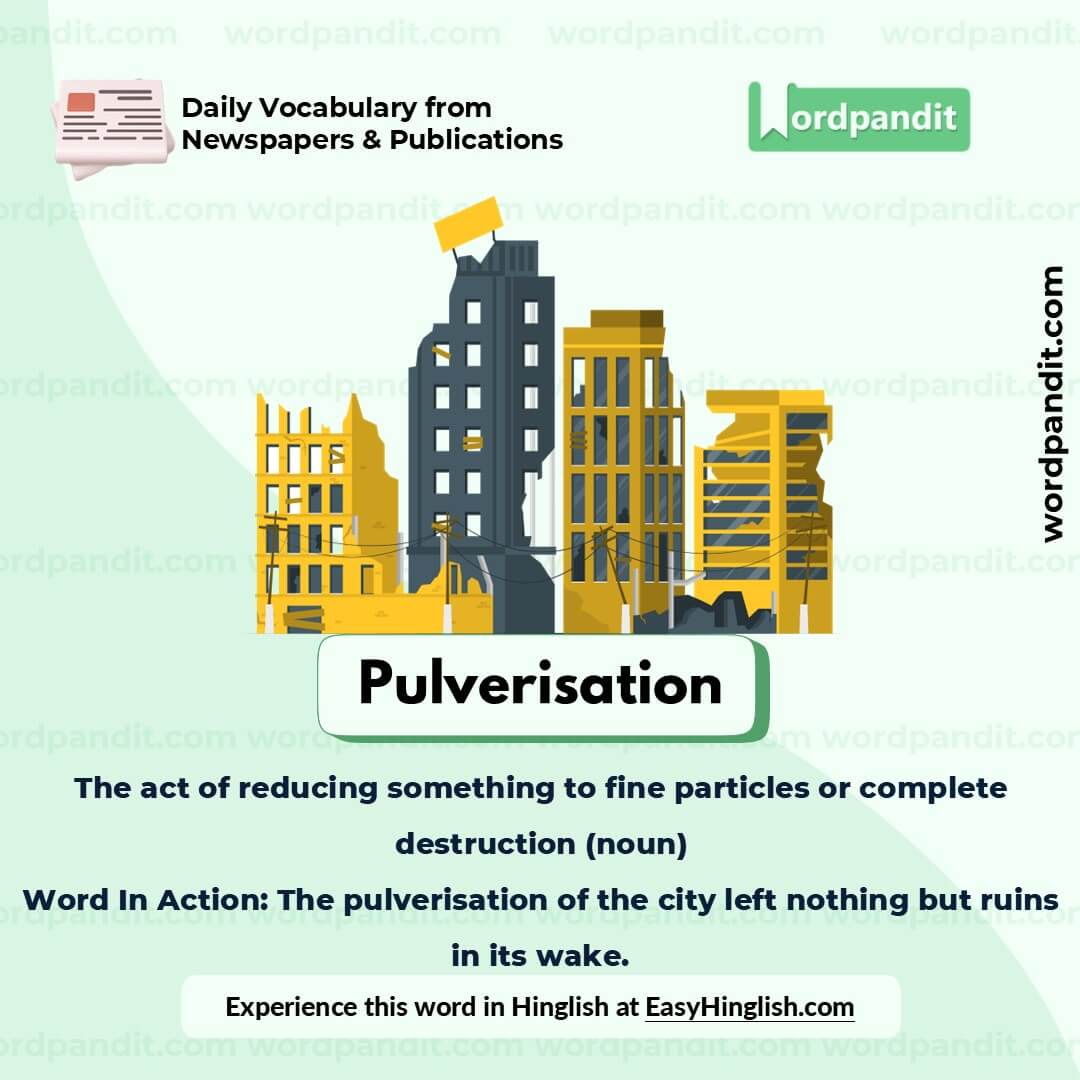Daily Vocabulary from International Newspapers and Publications
Expand Your Vocabulary with Wordpandit’s Global Vocabulary Hub
At Wordpandit, we are committed to helping you develop a truly global vocabulary by drawing from some of the most respected international publications. This section is designed to keep you ahead of the curve by introducing you to words that define global conversations and trends.
The Power of Global Sources
To help you think and communicate on a global scale, we curate vocabulary from renowned international sources, such as:
- The New York Times
- The Washington Post
- BBC
- The Guardian
- The Economist
- Scientific American
- Psychology Today
- And many more...
Stay Global, Stay Competitive
Our daily updates from international publications ensure you are consistently exposed to new words that reflect global news and developments, making sure your vocabulary is not only current but also globally relevant.
Enhance Your Global Perspective
Whether you’re preparing for international exams, aiming to excel in global business communication, or want to enhance your language skills for personal growth, Wordpandit offers the resources you need to thrive in a global context.
Effective Learning, Global Reach
Our learning methodology combines global examples, memory aids, and interactive activities, allowing you to internalize new words effectively and apply them in real-world scenarios.
Begin Your Global Vocabulary Journey Now!
Why Choose Wordpandit?
Practical Learning: Focus on words you'll actually encounter in real-world reading, enhancing your comprehension and communication skills.
Diverse Content: From current affairs to scientific breakthroughs, our varied sources expose you to vocabulary across multiple domains.
Effortless Integration: Make Wordpandit a part of your daily routine. Just a few minutes each day can significantly boost your lexicon over time.
Your Path to Vocabulary Mastery
- Visit our Daily Vocabulary section regularly
- Explore new words and their usage in context
- Practice incorporating these words into your own writing and speech
- Track your progress as your vocabulary expands
Start Your Journey Today
Embark on your vocabulary enhancement journey with Wordpandit. By consistently engaging with our daily posts, you'll build a robust vocabulary that serves you well in academic, professional, and personal contexts.
Remember, a word a day keeps linguistic limitations at bay. Make Wordpandit your daily companion in the quest for vocabulary excellence!
WORD-1: Meticulous
Context:
"Sullivan also lauded the ‘skilled work of the US military and meticulous joint planning in anticipation of the attack." - Al Jazeera
Explanatory Paragraph:
The word meticulous describes someone who pays extreme attention to detail and ensures that every part of a task is done with great care. It's about being thorough and precise, leaving no room for mistakes.
Meaning: Showing great attention to detail (adjective)
Pronunciation: muh-TIK-yuh-luhs
Difficulty Level: ⭐⭐⭐ (Intermediate)
Etymology: From Latin meticulosus meaning "fearful" or "timid"
Synonyms & Antonyms:
Synonyms: precise, exact, thorough, careful, detailed
Antonyms: careless, negligent, sloppy, imprecise
Usage Examples:
- She kept meticulous records of every meeting and event.
- The meticulous craftsmanship of the sculpture was admired by all.
- He is known for being meticulous in his work, leaving no room for error.
- The planning for the event was meticulous, down to the smallest detail.
Cultural Reference:
Famous painter Leonardo da Vinci was known for his meticulous attention to detail in his art and scientific studies.
Think About It:
Is it always a good thing to be meticulous, or can it sometimes slow down progress?
Quick Activity:
List three activities where being meticulous is crucial and explain why.
Memory Tip:
Think of "meticulous" as someone who measures every detail carefully to remember its meaning of precision.
Real-World Application:
Being meticulous is important in careers like surgery, architecture, and accounting, where attention to detail can be critical to success.
WORD-2: Complicit
Context:
"The US habit of flinging billions of dollars at the Israeli military...made it transparently complicit in Israeli efforts." - Al Jazeera
Explanatory Paragraph:
The word complicit means being involved in or connected to wrongdoing, even if indirectly. It refers to someone who knowingly participates in or allows unethical behavior to happen.
Meaning: Involved with others in illegal or immoral activity (adjective)
Pronunciation: kuhm-PLIS-it
Difficulty Level: ⭐⭐⭐⭐ (Advanced)
Etymology: From Latin complicare, meaning "to fold together"
Synonyms & Antonyms:
Synonyms: involved, implicit, entangled
Antonyms: innocent, uninvolved, blameless
Usage Examples:
- The company was complicit in covering up the environmental disaster.
- His silence made him complicit in the crime, even though he didn’t directly participate.
- Many people were complicit in the corruption, but only a few were caught.
- The investigation revealed several members of the team were complicit in the fraud.
Cultural Reference:
The 2017 Word of the Year by Dictionary.com was "complicit," a reflection of public discourse on people’s roles in injustice.
Think About It:
Can someone be considered complicit if they don't directly engage in wrongdoing but remain silent?
Quick Activity:
Describe a scenario where complicity could occur in everyday life, such as in the workplace or school.
Memory Tip:
Think of "complicit" as being "involved in a complex" situation of wrongdoing.
Real-World Application:
The concept of being complicit is important in legal cases, ethics, and human rights discussions where individuals or entities are held responsible for inaction or indirect involvement.
WORD-3: Thwart
Context:
"Not once has it occurred to the Biden administration to thwart Israel’s ongoing genocide of Palestinians." - Al Jazeera
Explanatory Paragraph:
Thwart means to prevent someone from accomplishing their goal or to stop something from happening. It often implies deliberate interference with someone's plans or actions.
Meaning: To prevent or stop (verb)
Pronunciation: thwort
Difficulty Level: ⭐⭐⭐ (Intermediate)
Etymology: From Old Norse thverr, meaning "transverse" or "across"
Synonyms & Antonyms:
Synonyms: prevent, block, frustrate, hinder, foil
Antonyms: aid, help, assist, support
Usage Examples:
- The government’s efforts to thwart the cyberattack were successful.
- She tried to thwart their plans by leaking the information to the press.
- The quick actions of the security team thwarted the robbery.
- Despite many attempts, they couldn’t thwart the competition’s success.
Cultural Reference:
In literature, villains often thwart the hero's efforts, as seen in classic stories like Sherlock Holmes, where antagonists try to block Holmes's investigations.
Think About It:
How can you balance the desire to thwart someone's harmful actions without becoming controlling or manipulative yourself?
Quick Activity:
Think of a time when you were thwarted from achieving something. How did you respond, and what did you learn from the experience?
Memory Tip:
To remember "thwart," think of "throwing a wrench" into someone’s plans—blocking or stopping them.
Real-World Application:
"Thwart" is commonly used in contexts like security, where efforts to thwart crimes or cyberattacks are frequent topics of discussion.
WORD-4: Retaliatory
Context:
"Never mind the retaliatory nature of its action." - Al Jazeera
Explanatory Paragraph:
Retaliatory refers to something done in revenge or as a response to an initial wrongdoing. It implies striking back at someone who has caused harm or offense.
Meaning: Relating to or involving retaliation (adjective)
Pronunciation: ri-TAL-ee-uh-tawr-ee
Difficulty Level: ⭐⭐⭐ (Intermediate)
Etymology: From Latin retaliari meaning "to pay back in kind"
Synonyms & Antonyms:
Synonyms: retributive, revengeful, vengeful
Antonyms: forgiving, reconciliatory, peaceful
Usage Examples:
- The country launched a retaliatory strike after the attack on its base.
- His harsh words were seen as retaliatory, coming after days of insults.
- The retaliatory tariffs hurt both countries involved in the trade dispute.
- The government took retaliatory measures after the cyberattack.
Cultural Reference:
In movies like Gladiator, the hero often seeks retaliatory justice for the wrongs done to them, fueling the narrative of vengeance.
Think About It:
Can retaliatory actions ever lead to lasting peace, or do they always fuel further conflict?
Quick Activity:
Write about a situation where retaliating made things worse. What could have been done differently to resolve the issue peacefully?
Memory Tip:
To remember "retaliatory," think of the phrase "tit-for-tat," which captures the idea of returning harm for harm.
Real-World Application:
Retaliatory actions are often seen in international politics, where military or economic responses follow aggressive actions from other nations.
WORD-5: Pulverisation
Context:
"The 2003 US pulverisation of Iraq comes to mind." - Al Jazeera
Explanatory Paragraph:
Pulverisation refers to the act of completely crushing or destroying something into tiny pieces, often to the point of obliteration. It's commonly used to describe intense physical destruction.
Meaning: The act of reducing something to fine particles or complete destruction (noun)
Pronunciation: puhl-ver-uh-ZAY-shun
Difficulty Level: ⭐⭐⭐ (Intermediate)
Etymology: From Latin pulverizare meaning "to reduce to dust"
Synonyms & Antonyms:
Synonyms: destruction, demolition, crushing, grinding
Antonyms: construction, building, formation, creation
Usage Examples:
- The pulverisation of the ancient building left nothing but dust.
- After the bombardment, the area looked like it had undergone complete pulverisation.
- The demolition crew used explosives to pulverize the structure in seconds.
- The relentless waves pulverized the rocks on the shore.
Cultural Reference:
In science fiction movies like Independence Day, entire cities are often pulverised by alien attacks, representing total destruction.
Think About It:
Is it ever justified to cause complete pulverisation in warfare, or should there be limits to the destruction caused?
Quick Activity:
Find three objects in your home that could be pulverised, and explain how they could be broken down into tiny parts.
Memory Tip:
To recall "pulverisation," think of "pulverize" as turning something into "powder"—both begin with "p".
Real-World Application:
Pulverisation is a critical process in mining, where rocks are crushed to extract valuable minerals.
















